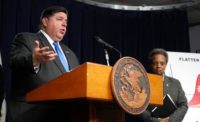Despite a statewide stay-at-home-order that deems construction as “essential” work, confusion continues across California as contractors, owners and construction workers look for government guidance on how to interpret vague and varying language from the state and its 58 counties and 480 cities.
Gov. Gavin Newsom’s March 19 stay-at-home order mandates that all California residents stay home, except for persons working on 16 essential critical infrastructure types, as identified by the federal government, including communications, chemicals, dams, energy, transportation systems and water, among others.
For ENR’s latest coverage of the impacts of the COVID-19 pandemic, click here
The California Dept. of Public Health clarified the state order by designating that exemptions apply to “workers who support the operation, inspection and maintenance of essential public works facilities and operations, including bridges, water and sewer main breaks,” for instance. Also exempted is the “construction of critical or strategic infrastructure,” but neither that agency nor the governor’s office would clarify that term further.
“It could be clearer,” says Mark Hartney, partner at Allen Matkins, a California-based law firm specializing in real estate. Hartney noted the order’s parenthetical addition of “including housing” to the initial order creates uncertainty.
Hartney points to local orders such as those from Los Angeles and Santa Monica, both of which have exempted commercial construction from stay-at-home orders.
“We know that by law, and expressly in these orders, that a local jurisdiction can be more restrictive but not less restrictive than the state,” says Hartney.
Daniel Engler, partner at San Francisco’s Cox Castle and Nicholson, agrees that the governor’s order as first written added to uncertainty.
However, “There is still the question of whether the governor’s order supersedes local city and county orders,” Engler adds.
For Hensel Phelps, the steps taken by the Counties and State have been helpful and sufficient to clarify construction as an “essential function.”
“We are extremely fortunate that 90% of our projects in Northern California were not halted,” says Dave Valentine, Hensel Phelps project development director, NorCal district. “We are actively following the orders sent out by the State of California, the CDC, and the individual jurisdictions where our projects are located, typically adhering to the most stringent requirement.”
The AGC of California interprets the governor’s order as having exempted construction from the state’s shelter-in-place rule, but is advising members to adhere to more restrictive city or county mandates until there is greater clarity.
“As of this moment, some local authorities are continuing to enforce stricter ordinances than the Governor’s executive order; we do not have clarity or definitive answers as to who supersedes who,” says Peter Tateishi, chief executive with AGC of California. He notes that some cities and counties do not consider grocery stores as critical or essential for construction purposes.
For example, “Contractors building or repairing a grocery store are not exempt, but the actual store or function being performed at the project would be exempt,” Tateishi says.
The association is asking all counties to mirror the governor’s executive order.
“We believe that in times of crisis, it is better for the people and our recovery if we are all working in a coordinated fashion and bringing some certainty to these uncertain times,” Tateishi says.
As of March 24, union contractors trade association United Contractors (UCON) advised contractors working in areas with stricter ordinances to contact the project owner or local government for direction. UCON, which represents more than 500 California contractors, vendors and engineering and design firms in heavy construction, is coordinating with Caltrans, local agencies, union leaders, association CEOs and contractors as the COVID-19 response evolves.
“Contractors are being bombarded with information-overwhelm and uncertainty,” says Emily Cohen, UCON executive vice president. “They need clarity, guidance, and relevant, up-to-date information on a range of issues.
“This is an all-hands-on-deck situation,” Cohen says.





Post a comment to this article
Report Abusive Comment